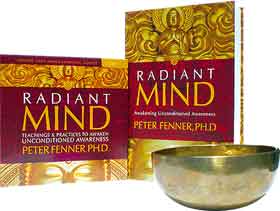Because it is devoid of any innate substance, meditation does not exist. The act of meditation is not meditation. Because it is neither substance nor nothingness, meditation cannot be a conceivable reality. — Kalachakra Tantra
Peter: Those of you who have received teachings on the Tibetan Mahamudra and Dzogchen traditions are aware of a space that is talked about as “the meditation which is no meditation”. Essentially, what we are experiencing now is the space they’re talking about. We are in a contemplative space, yet there is nothing we are doing to create this. Meditation is occuring, without any action of “meditating”. In fact, it isn’t possible to “meditate” within this space because there is nothing we could achieve by doing this.
[Pause]
Man: Do you mean that this, right now, is meditation that is non-meditation?
Peter: Yes. You can imagine that if someone stepped into this room right now, they would very likely think that we are meditating in some way. They would easily sense the serenity and stillness in the room, and would conclude that we are in a state of meditative awareness, even though we are interacting. But, in reality we’re not meditating. This is happening, without us doing, or not doing, anything. This is just transpiring.
[Silence]
Woman: It feels like meditation is doing us, rather than us doing meditation.
Peter: Yes, traditions like Dzogchen and Mahamudra, talk about discovering ourselves in a contemplative state, rather than creating this state. There’s no decision to start to meditate. Instead, we find ourselves wherever we are-standing up, sitting down, interacting, reflecting, and so on.
[Pause]
You can also notice that it is impossible to do “more” of this, because we aren’t “doing” anything. Nor can we do less of this, because there isn’t any “it” that we’re doing.
[Silence]
Peter: Another reason this state or experience is called “non meditation”, is because there’s nothing to prolong and nothing to stop. We can’t be meditating because there is nothing to continue or discontinue. There is nothing to be disturbed or cultivated. It doesn’t make any difference if our eyes are open, or closed. Keeping our bodies still, or moving them, doesn’t influence the space we are in, because this space simply doesn’t exist. This is the paradox. We are quite clearly in a different space than where we usually are, yet it is impossible to say “where” we are. Beyond the obvious fact that we are in the room, we don’t seem to be anywhere.
Man: As you were talking, I have this very clear sense that I have always been in this state we are in now. There are times when I think that I’ve lost it, but this is just thinking that I’ve lost it.
Peter: In just the same way that thinking you have got it, or are in it, is just “thinking” that you are in it!
[Silence]
Woman: What about distractions? A few minutes ago I sort of left this state because I started to pay attention to a mosquito that was buzzing about.
Peter: What state? It seems that your attention was redirected, in just the same way that it is now redirected to this interaction.
Woman: So, I’m not clear. Are we in this state all the time?
Peter: What state are you talking about?
Woman:This state.
Peter:What state?
[Silence]
Woman: What about when we go to sleep. Does it stop then?
Peter: Nothing is happening, so how could this stop when we are asleep? In terms of this state, it makes no difference if we are asleep or awake.
Man: Or, even whether we are dead or alive.
Woman: I’m confused, you seem to be talking about something, and then you say it is nothing.
Peter: Yes. If you try to “think” about this, if you try to understand it, it is paradoxical – that’s simply the way it is.



